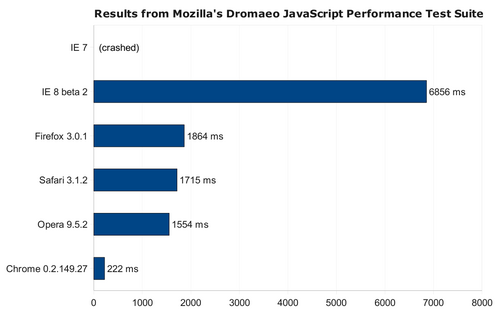This evening I had the chance to download Google’s newly-released (and by “released” I mean “beta”… hey, it’s Google) web browser, Chrome, and give it a try. They weren’t kidding when they said V8, the new JavaScript virtual machine in Chrome, should raise the bar for next-generation JavaScript implementations: it’s fast. How fast?
The above results are from Mozilla’s Dromaeo JavaScript performance test suite, so there’s little worry of this test being intentionally biased in Chrome’s favor. The scores above are the averages of five test executions on each web browser, running in the same Windows XP virtual machine on the same computer. Some notes:
- Each run of the test was performed in a fresh browser instance.
- IE 7 was unable to complete the test suite without crashing, although I am using a special, standalone version of IE 7 so this may be particular to my installation.
- In order to prevent IE 8 from complaining about the long JavaScript execution time, I set set the registry value MaxScriptStatements = (DWORD) 0xffffffff in the key \HKEY_CURRENT_USER\Software\Microsoft\Internet Explorer\Styles.
So yes, Chrome does in fact have a much faster JavaScript engine than any …

